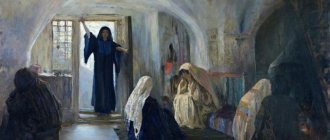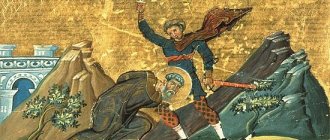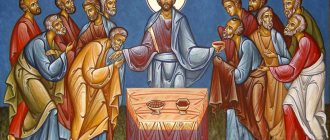Dear reader!
This material is collected from the Patristic literature, which is freely available on the Internet, both separately (in excerpts) and in entire electronic books, the volumes of which are very large for the modern reader, who, as a rule, is accustomed to grasping only the superficial essence. The author of this project has systematized and selected the material as much as possible, highlighting the most important things, focusing on his point of view.
The creator of this project does not claim authorship of the presented materials and strongly recommends that interested readers purchase the full versions of the Patristic works in printed form. The sources used are listed in a special section of our website “Recommended Literature and Sources”; in addition, we accompanied each book with a short review, useful for all concerned readers.
Temptation... How often do we hear these words from worldly and near-church people, but what do people mean by this word and what does it really mean? How to survive the circumstances that are associated with this formulation?
After studying several works of various Holy Fathers, we can give a small definition of temptation.
So, temptation is an inconvenient life circumstance that can be associated with both spiritual difficulties and daily problems. Temptation arises according to God's providence when the Lord allows it, but the maker of temptation is always demons, whom a person allows close to him when he sins, and the Lord moves away at this time and allows him to do so at an unbearable time.
The question of how to survive temptation can only be answered by a spiritually experienced and life-experienced person, this is what Paisiy Svyatogorets said to his spiritual children:
№11 (188) / March 15 '02
Spiritual flower garden
In this topic:
Spiritual flower garden
Smoking is incense for demons. According to the teachings of Nicodemus the Holy Mountain and other holy fathers
Spiritual flower garden
Conversation about the fast of Archpriest Alexander Shargunov
This topic, not sufficiently covered in the pages of the church press, is very relevant in our time - a time of increasing disdain for the moral values and commandments of Christ. The reason for the creation of this article was the exemplary educational activity of the Greek Orthodox Church, whose spiritual shepherds widely discuss such topics and publish relevant articles and books.
Human Origins
Man was created in the image and likeness of God (Gen. 1:26) and at the very beginning of his existence received from God the holy commandments for unconditional fulfillment. As a result of the disobedience and fall of the first people in Paradise, man lost his original perfection and his likeness to God. Man has learned the secrets of good and evil. Along with original sin, he inherited the tendency to give in to vicious passions.
Increasing sinfulness alienated man from God and led him to spiritual death. The new Adam - Jesus Christ, the true God, became a perfect man for the sake of our salvation. As the God-man, He defeated and overthrew the tyranny of Satan, opened the gates of the Kingdom of Heaven for man, showed the path to perfection, ways to combat sins, and bestowed the means of salvation. He expects from us a voluntary, decisive choice that will determine our future destiny. Submission to God's will frees us from captivity to sin, leads to union with God and the recovery of the lost heavenly life. Otherwise, a person indulges in the illusory pleasure of sin, becomes its slave, a breeding ground for impurity and demons, with which, in the end, if he does not repent in time, he will remain forever.
Testimony of the Holy Scriptures
From a young age, a person is attacked by many different temptations, and the most sophisticated of them are bodily temptations. The Holy Apostle Paul in his letter to the Corinthians warns: Do you not know that your bodies are members of Christ? So, shall I take away the members of Christ to make them the members of a harlot? It won't happen! Or do you not know that whoever has sex with a harlot becomes one body with her? for it is said: the two will become one flesh. And he who is united with the Lord is one spirit with the Lord. Flee fornication; Every sin that a person commits is outside the body, but the fornicator sins against his own body. Do you not know that your body is a temple of the Holy Spirit who dwells in you, which you have from God, and you are not your own? For you were bought at a price. Therefore glorify God both in your body and in your soul, which are God's (1 Cor. 6:15-20). Elsewhere we read: for out of the heart come evil thoughts, murder, adultery, fornication, theft, false witness, blasphemy (Matt. 15:9).
Thus, Holy Scripture confirms the opinion of St. fathers that the human heart is a nest of lusts. Unclean, evil thoughts are realized in shameful actions. And passionate thoughts, in turn, come from our tendency to sin.
Ways to deal with bodily temptations
The Holy Fathers teach us that every sin draws its strength from unclean thoughts. The lust that appears in the thoughts, stored in the heart, degenerates into the desire to try the forbidden fruit, and when a person decides to fulfill it, he begins to look for ways to commit sin.
Now it is clear that in order to win victory over temptation, one must destroy it in the very bud. The art of struggle lies in observing and controlling our thoughts and feelings, especially our sight and hearing - that is, how we perceive these temptations. This is what Abba Dorotheos advises: “The most effective weapon against all sinful thoughts, no matter where they come from, is the invocation of the Name of God. Only those saints who have gained power over demons by the power of the Holy Spirit can command unclean thoughts to go away. For us, the unworthy, it is only possible to resort to the Jesus Prayer, so that in moments of spiritual indignation Christ Himself will intercede for us and, with His almighty Word, drive away from us the treacherous aroma of temptation. All temptations and sinful thoughts are identical to demons, and their power is most perfectly defeated by God Himself” (Teachings of Abba Dorotheus, Jordanville, 1970, p. 248).
One day St. Macarius of Egypt (IV century) visited the brethren in a distant desert. Passing by the cells of one of the monks, he saw many demons having fun there. The saint realized that this brother was neglecting his monastic vows and indulging in unclean thoughts. Entering the cell, St. Macarius advised this brother to read the prayer rule, not paying any attention to sinful thoughts. And when he diligently carried out the orders of St. Macarius, then freed himself from misfortunes.
Another monk, who labored in the Egyptian desert, mentioned in the book of the elders, was attacked by unclean thoughts. Not finding enough strength in himself to resist them, on the next Sunday, when the brethren gathered for common prayer and the Eucharist, he, in the presence of all those gathered, spoke about the temptations pursuing him and at that very moment felt relief. So this humble confession healed him. Another remedy against carnal temptations is confession to the spiritual father.
An example of immaculate bodily purity is Joseph, the son of the patriarch Jacob (Gen. 37–39). From Old Testament history we learn that he was sold into slavery by his brothers in Egypt. The commander of Pharaoh's troops, Potiphar, bought it there. The Lord God accompanied Joseph, and he was successful in everything. After some time, he gained the trust of his master, who entrusted him with the management of his house. Joseph was handsome, which attracted the attention of Potiphar's wife. And his master’s wife turned her eyes to Joseph and said, “Sleep with me” (Gen. 39:7). One day, when they were left alone in the house, the woman tried to fulfill her sinful lust and involve Joseph in a sinful relationship, but he resolutely resisted, answering with such saving words for him: how can I do this great evil and sin before God? (Gen.39:9). Joseph escaped from the hands of the slutty woman and ran out of the house. Only Joseph's cloak remained in her hands. In retaliation, she accused him to her husband of attempted violence. It all ended with Joseph being thrown into prison, but even there the Lord God did not leave him. Pharaoh happened to see incomprehensible, mysterious dreams, and only Joseph was able to interpret them. Having thus won the trust of Pharaoh, Joseph became his confidant, and thanks to the help of God and his wisdom, he saved all of Egypt and his entire family from hunger, inviting them to him.
Thus, the wise Joseph, having overcome misfortunes and temptations, found double happiness and God's blessing: a life of abundance and a reward in eternal life. The Holy Church remembers the glorious deeds of Joseph on Holy Great Monday before Easter, glorifying and praising his spiritual courage, showing the faithful how worthy of imitation his actions are. The life of Joseph, in addition to the historical one, also contains a spiritual aspect. In patristic literature, Egypt is a symbol of debauchery and sin. Joseph, through exemplary behavior, gained power over material Egypt and became a symbol of victory over its sins. The story of Joseph teaches us that the third means of combating carnal temptations is the fear of God and a vivid awareness of His omnipresence.
St. was subjected to a similar temptation. Ephraim the Syrian visiting Edessa in Syria. He was met there by a certain harlot, who was inflamed with passion for the saint and without hesitation told him about it. St. Ephraim, wanting to turn the unfortunate woman onto the path of repentance, brought her to the main square of the city and told her: “Here we can satisfy your desire.” Confused, the woman answered the saint: “In the presence of such a crowd of people?” “You are ashamed of people,” asked the saint, “but are you not ashamed of God, Who sees us all the time?” How can you create such obscenity before the All-Seeing Creator and Judge? Do you really not know the words of the Holy Scripture: Or do you not know that the unrighteous will not inherit the Kingdom of God? Do not be deceived: neither fornicators, nor idolaters, nor adulterers, nor fools, nor homosexuals, nor thieves, nor the covetous, nor drunkards, nor revilers, nor extortioners will inherit the kingdom of God” (1 Cor. 6:9-10). The saint's words awakened her conscience. In heartfelt contrition, she asked him for forgiveness and prayer for her sinful soul. So the former harlot embarked on the path of repentance and Christian achievement.
And this is what the young warrior Nikolai experienced. This happened in the 7th century in Byzantium, during the reign of Caesar Nicephorus. At this time there was a war with the pagan tribes inhabiting modern Bulgaria. Nikolai was drafted into the army and went to the gathering place of his regiment. The journey lasted several days. On the first night he stopped to rest in a tavern in a certain small town. At midnight he was awakened by a knock on the door - it was the daughter of the inn owner. When she hosted a young stranger, carnal desire awoke in her. Entering his room, she, without a shadow of embarrassment, told him the purpose of her visit. Nicholas was raised in a devout Orthodox family, and his conscience did not allow him to succumb to shameful temptation. He resolutely asked her to leave. She didn't give in. Then, raising his voice, he explained to her that he was going to war. How can he denigrate his soul and body with such an action? In a few days he may die: what answer will he give to God for such an offense? Having said this, he crossed himself and ran out of the tavern. Having found another place to spend the night, he fell asleep and had a dream. A plain opened up to him, on which the battle between the Greeks and Bulgarians was raging. At first the Greeks had the upper hand, but the Bulgarians withstood the onslaught and then won. When Nicholas took a closer look at the fallen Greek soldiers, his gaze stopped at some empty place, which seemed to be missing someone. A mysterious voice explained to him that this place was intended for him, but thanks to his resistance to temptation, the Lord God extended his life. Otherwise, he would have died, disgraced by sin and having no hope of saving his soul. Everything he saw in his dream soon came true. So Nicholas, having withstood the temptation, saved his life and saved his soul from eternal condemnation.
This incident shows us the fourth remedy against temptation: the awareness of inevitable death and the coming Last Judgment.
Here are some practical tips to help maintain purity of body and spirit, which Elder Paisios passed on to his students.
He drew attention to the fact that the duty of a monk and every Christian is to preserve oneself in spiritual and physical purity, from baptism to death. This is of great importance for the future afterlife in eternal life.
The monastic rank under no circumstances can be involved in carnal sins. For a person who has dedicated himself to God, this is the greatest defeat. Worldly people who have a family are obliged to maintain mutual fidelity. In order to avoid excessive stimulation of the flesh, Father Paisius advised maintaining moderation in eating and drinking alcohol. For some, it is necessary to completely eliminate the latter from use. Before going to bed and after waking up, you should make the sign of the cross on yourself, baptize your home and your bed to the four cardinal directions. It is necessary to fall asleep with thoughts of God or with prayer and never with unclean thoughts. You can eat food, even plain water, no later than 3-4 hours before bedtime. It is best to sleep on your right side, less often on your back and never on your stomach. You should also constantly keep your thoughts, sight and hearing clean, protecting them from indecent conversations and images, and cleanse your heart with prayer, best of all the Jesus prayer; people should be looked at as creations of God, and not as objects of desire.
If the above advice seems to someone like interference in the personal sphere, then we ask you to be patient, since the purpose of these instructions is the salvation of the human soul. We must not forget that the price of one saved soul exceeds the price of the whole world (Matt. 16:26).
According to the teaching of the New Testament, spiritual struggle and bodily abstinence are directed not against human flesh as such, but against the sinful inclinations of man and the lusts born in him.
Guides to Temptation
The most formidable opponent of man in his spiritual struggle and self-improvement is Satan. To lead a person into temptation and sin, he uses all possible means and methods. It fuels our weaknesses and sinful inclinations, and encourages us to enjoy the pleasures of this world. To make temptations more effective, Satan secretly introduces them into our hearts through the senses: sight, hearing, smell, taste, and touch. And although fallen angels are spiritual creatures, they act in two ways: both invisibly, like disembodied spirits, and visibly and materially, through tangible Objects and the people around us. It is necessary to know these temptations and how to combat them.
Clarity of vision
Inspired by the Holy Spirit, the words of the Gospel teach us: the eye is the lamp of the body. If your eye is pure, then your body will be without blemish. If your eye lusts, then your body will burn with lust (Matt. 6:22-23).
Here is an example of maintaining the purity of your vision, taken from the life of Saint Sava the Sanctified (5th century), who spent most of his life in the desert near Jerusalem. When many disciples and followers gathered around him, the saint founded the famous Lavra, which is active to this day. One day he, accompanied by one of his young disciples, went to the holy city of Jerusalem. On the way, they met a group of pilgrims heading to their monastery. Among them was one young, rather beautiful girl. St. Sava talked with them, blessed them and moved on with his disciple. When they moved away from the pilgrims they met, St. Savva, testing his student, asked: “What do you think about this girl? It seems to me that she was missing one eye.” The student replied: “No, no! Her eyes, father, were all right. I looked at her very carefully.” Hearing such an answer, the elder reminded the disciple of how necessary it is to protect his eyesight, and for carelessness, which Satan could use, he assigned the novice penance. Returning to the monastery, the holy elder ordered the disciple to retire into complete solitude, while observing strict fasting and tireless prayer. Upon completion of the required task, the student was accepted back into the monastery.
Saint Basil the Great calls the eyes hands without a body, because with the help of visual memory a person can hold, embrace, and enjoy previously seen shameful images or scenes. The wise Solomon said: Do not covet her beauty (a slutty woman) in your heart, lest you be caught by your eyes, and lest she captivate you with your eyelashes (Proverbs 6:25).
In another place of the Holy Scripture it is said: A woman’s inclination towards fornication is recognized by the lifting of her eyes and eyelids (Sirach.26:11). Also indicative are the words of our Lord Jesus Christ, spoken by him in the Sermon on the Mount: Anyone who looks at a woman with lust has already committed adultery with her in his heart (Matthew 5:28).
How can a person resist visual temptations?
First of all, it is necessary to avoid looking at seductive, unchaste pictures and meeting people whose appearance evokes carnal desire. Particular care should be taken to avoid those places where a person has already succumbed to temptation. When walking, you should lower your eyes to the ground. Having met a familiar person, you should not look at her figure. It is very important that tempting memories are not imprinted on your memory. Apart from our caution, the most successful help for us will be the Jesus Prayer: “Lord Jesus Christ, have mercy on me.” Its diligent repetition will protect us from the appearance of temptations and will not allow the appearance of an object of desire in our heart, since together with the invoked Holy Name, our Savior and God will dwell in our heart, Who will protect us from indecent temptation.
Many great men have fallen prey to the temptations of the flesh through the lust of the eyes. One of them was the Old Testament king and prophet David. One day, looking out the window, he saw Bathsheba, the wife of the warrior Uriah, bathing naked. Attracted by her extraordinary beauty, he committed two grave sins: he sinned with her physically and caused the death of her husband Uriah, sending him to war. When her husband died, David took Bathsheba as his wife. Then the Lord God sent the prophet Nathan to David to reveal his sins. The king realized his guilt and confessed it to God. After this, his life was filled with repentant crying and service to God and people. He courageously endured the punishment assigned to him, and expressed his repentance in the famous 50th Psalm. The Lord accepted his repentance and forgave him for his sins (2 Samuel 11–12).
Hearing as one of the ways of penetration of temptations
Hearing is a gift from God and in itself has nothing wrong. But, due to our sinful inclinations, it can be used by Satan to tempt us. Most often this happens when:
- Listening to songs with frivolous lyrics or music that excites the senses and nervous system with its rhythm.
- Listening to questionable stories.
- Using expressions in speech that have a passionate, lustful connotation.
All this causes dispersion of consciousness, excitement of the body and entrainment of the soul with bodily lusts. All together, this leads to the muffling of the voice of conscience, indifference towards the Gospel commandments and alienation from God.
Why? Because a confused person can indulge in adultery in his heart.
The Holy Fathers of the Church of the 4th century, St. Basil the Great and St. Gregory the Theologian, warned the youth of his day against temptations arising from following corrupt morals and customs, listening to secular music and songs. How timely and relevant are these warnings now, for today’s young people!
Smell
The third sensory trap is the sense of smell, the significance of which in awakening bodily desires is very great. Our sense of smell is attacked by perfume products, all kinds of perfumes, incense, etc. By the way, a characteristic feature of women of easy virtue is the excessive use of intoxicating, strong perfumes.
Saint Gregory the Theologian wrote: “It is impossible to enjoy the aromas with which our senses revel.” Even the Old Testament prophets Amos and Isaiah warned women of that time against using perfumes (see Amos, Is. 3:13).
An example of Christian abstinence for us is St. Syncletikia, Roman aristocrat. And before accepting monasticism, she did not admire either expensive perfumes, or magnificent clothes, or music. Only in constant prayer did she find satisfaction and spiritual pleasure. Convinced that the greatest obstacle to the salvation of the soul was her own young body, she constantly burdened it with fasting and physical labor. Saint Syncletikia so accustomed herself to abstaining from food that when she happened to eat a large meal, she felt more weakened than when she ate her usual small amount of food.
Taste
The fourth way of penetration of temptations is taste. The habit of enjoying food or drink leads to overeating and drunkenness. The consequence of this weakness is increased bodily excitability. Saint Gregory of Nyssa warns: “The craving for the pleasure of taste is the source of all evil and sin.” The Holy Apostle Paul in his letter to the Philippians teaches us: Their end is destruction, their god is their belly, and their glory is in shame; they have earthly minds (Phil. 3:19).
Refined dishes and alcoholic drinks are the best conductor of temptations for the body. A true Christian cannot allow himself to be overcome by the pleasure of taste. We are obliged to diligently observe the fasts appointed by the Church and be abstinent in everything. Otherwise, we will become slaves to sin and Satan.
Touch
The next, fifth way of penetration of temptations is the sense of touch. With the help of touch, bodily lusts are kindled in us in the blink of an eye. Strengthened by the influence of Satan, they easily lead a person into sin and incline to debauchery. The Fathers of the Church, first of all Isaac the Syrian, warn us not to touch our body unless absolutely necessary, especially in sensitive places, and it is absolutely unacceptable to touch someone else’s body.
Once Abba Cyrus of Alexandria was asked about unclean thoughts. The holy elder replied: “He who does not have unclean thoughts commits unclean deeds.” This means that the one; whoever does not struggle with the temptations of the flesh in his thoughts and does not resist them falls into such sin with his body; and the one who indulges in the pleasure of bodily sin is not haunted by unclean thoughts. Abba Agathon taught: “Avoid society that can lead to a sinful fall.”
It is necessary to follow the words of the Gospel and avoid fornicators, even if they are your friends, acquaintances, relatives or bosses; try to stay away from everything that leads into temptation.
Saint Ephraim the Syrian adds: “Be careful in any society, for hellish jealousy reigns among the persons belonging to it. When some of them commit shameful acts, they immediately seek to drag the rest into their deeds.”
Temptations of the flesh accompany a person until his death, because... are often caused not only by the attraction of the body itself, but also by the action of lustful mental dreams. Whoever thirsts for salvation and Eternal Life will listen to these tips.
Blessed by God and people are those who have never stained either their soul or body with carnal impurity. The Holy Evangelist John the Theologian testifies: And I looked, and behold, a Lamb stood on Mount Zion, and with Him one hundred and forty-four thousand, having the name of His Father written on their foreheads. And I heard a voice from heaven, like the sound of many waters and like the sound of great thunder; and I heard the voice of harpists playing their harps. They sing, as it were, a new song before the throne and before the four living creatures and the elders; and no one could learn this song except these hundred and forty-four thousand who were redeemed from the earth. These are those who have not defiled themselves with their wives, for they are virgins; these are the ones who follow the Lamb wherever He goes. They are redeemed from among men, as the firstborn of God and the Lamb. And there is no deceit in their mouth; they are blameless before the throne of God (Rev. 14:1–5).
Nevertheless, those who, although due to human weakness could not resist temptation, purified themselves with unfeigned repentance and washed their souls with bitter tears, also deserve heavenly bliss, as described in the 50th Psalm: Have mercy on me, O God, according to Your great mercy and According to the multitude of Your compassions, cleanse my iniquity... You alone have sinned and created evil before You... Sprinkle me with hyssop and I will be cleansed, wash me, and I will be whiter than snow... (sprinkling with hyssop is a symbol of repentant tears).
Hieromonk Gabriel (Kranchuk)
(End to follow)
In other rooms:
Survive temptation
How to survive the great test (temptation). Tolerate. Patience is the most powerful medicine that cures severe and long-lasting troubles. Most troubles go away only with patience. Great patience unravels the most confusing things and brings Divine fruits. Where you don't see any solution, God gives the best solution.
While enduring temptations, God loves people who are uncomplaining and courageous.
Everyone in this life strives for their own feat.
The basis of patience is love.
With a little patience that a person shows at a difficult moment, he can acquire Divine Grace. Christ did not give us any other way to salvation except patience.
An example about family - divorce - mistress and wife again - death of husband - great wealth.
Job's Way
Sorrows and troubles will not escape us. Life works like this, we live in such a world. There is no justice in it, which we often look for: if I read morning and evening prayers, go to church every Sunday, regularly confess and receive communion, do not eat meat or cottage cheese during Lent, make so many bows, then there will be no sorrows in my life it should, but if they come, it’s unfair. This is not the way to approach faith. The Lord tells us: In the world you will have tribulation (John 16:33).
Temptations will not pass us by, no matter how hard we try, no matter what we do. The desire to avoid sorrows brings even more suffering into our lives, because it is not so much they that upset us, but the reluctance of these sorrows.
The search for justice is a road to nowhere. God does not seek justice. God is Love and always treats us with love. The devil seeks justice. The path of seeking justice is the path of suffering.
I have met people who have dedicated their entire lives to seeking justice. These are unhappy people who are fixated on some things that, in their opinion, are unfair. You don’t want to have anything in common with such people - they simply plunge you into despondency, fill your soul with despair, because they themselves are filled with them. There has never been justice in the world, and God is not looking for it either. He judges us by love. Look at the Cross: the Lord did not make us suffer for our sins, He Himself went to the Cross in our place.
If something bad happens to us, we should not ask ourselves the question: “Why?” And they must ask the question: “Why do I need this? How can I use this to my advantage?” Suffering is a tool that can be used for your benefit or harm.
When grief comes...
Sorrows happen in our lives. Everyone can react to them differently due to their spiritual state and spiritual growth. How to do this correctly? Sometimes people come to me and ask about spiritual life: should I do this or that? The word “need” is not entirely appropriate here. Temptations and sorrows always cause sadness. The word “joy” is also inappropriate here. We can learn to perceive sorrow as a tool that helps us cleanse ourselves of sins and passions, rethink our views, and reassess our values.
Maybe grief will help us get rid of some sin. This is medicine. Medicines are often bitter. However, if it helps to overcome some sinful illness, then, of course, the result of this sorrow will be joy. At the same time, you need to experience grief. Personally, when something unpleasant happens in life, I am helped by the thought that everything in our lives is not accidental, and the Lord sends this so that we can be cleansed and change for the better.
Again, it all depends on us. As the holy fathers said, grief is like fire that purifies gold or from which clay hardens. And what our heart will be like - whether it will harden in sorrow, become like a stone, or will still be purified like gold - depends on us, on how we react to what happens to us. If we treat grief with dignity, the result will be comfort, but if we treat it unworthily, we will only worsen our condition.










